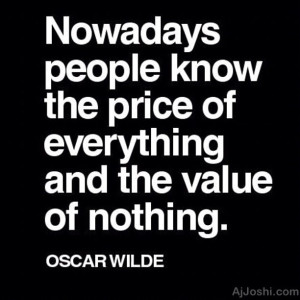What are you worth? Do you and the services you can offer have a realistic material value or would you be happy to continue doing what you do for nothing? And think carefully about this: are you realistic in what you expect by way of return? What makes you worth anything – and it’s not just your qualifications or experience, it’s often something intangible, maybe your motivation to do what it takes to succeed in the role?
In selecting the jobs we want to apply for, we are inherently determining our own self-worth, the value we put on our services, the status we apply to ourselves and our own sense of self-importance. You might think you are worth £20,000 a year, or £40k or £70k or £100k, or a million (and look how those figures have expanded within our lifetimes!) If you are competitive you may want just a little bit more than your biggest rival. But then again you might find you can only get work paying a fraction of that. Or you might not care about money at all – you might just want something that rewards you spiritually – so long as you have a bed for the night and a nourishing meal. Or enough to go out and get pissed every night.
For myself, I’m not driven by acquisition of money for the sake of it, though I do like nice things in life (notably good food, travel, culture etc.) It doesn’t matter to me if from my self-employed role I never become a millionaire, though just enough to see my kids happy and healthy and to enjoy a decent lifestyle is plenty – the benefit of working for yourself being that you are not competing against anyone else. There are times when I’ve been skint and other times when I’ve been flush. But if I more cash than I knew what to do with I would get lazy, and by the economic principle of diminishing marginal returns I dispute whether big bonus culture acts as an incentive to effort anyway.
Ah, but money does not buy happiness, though it sure makes you unhappy in style – but for some there is a minimum quality of life they are prepared to tolerate unless and until the sky falls in and they have to slum it with the rest of us. But at all levels there are shades of expectation and status symbols that can be bought at various income levels. Far from the communist ideal of everyone earning the same money for their contribution to the good of society, because by nature most of us can’t help wanting to be one up on the Joneses, or is that too facile?
Recently I was talking about the fact that the dirtiest jobs, the ones nobody wants to do unless the alternative is to go hungry, are also the worst paid in our society, which in turn got me thinking about worth and value. What determines how well someone gets paid? You would like to think those who have worked long and hard to gain qualifications and the best experience would earn most, or the “worthiest” of professions, notably medical doctors or those who do most good to humanity, but needless to say it never works out that way. Broadly speaking, those at the top of the tree fall into three categories:
- “Rare and special talents” – scarce resources deemed so skilled at their art they must be rewarded highly, particularly if their talent is perishable – like footballers, the most popular musicians (not necessarily the best musicians), actors and other non-essential skills!
- Entrepreneurs who from nothing establish world-leading businesses by a combination of hard work and a lot of luck. In some cases you might say their wealth is unearned income, but their worth is encapsulated in the taking of risks and failing en route to eventual success.
- Those who earn most cash for their employers, typically the high-flying traders and others employing risk/reward strategies for banking institutions, though there is always a case for saying that such instances are often due to luck rather than skill, and in the case of bankers you would understand huge bonuses if there was a commensurate penalty for every time they lose money, but it seems one-way traffic.
As for entertainers of one sort or another, if they are imbued with natural skill and develop that skill through hard work to the point where they are at the pinnacle of their profession you could understand how the premium reward would apply. For top footballers the going rate is typically £200+k per week, which works out to more in a month than most will earn in a lifetime. Yes, careers are comparatively short though many footballers are comparatively short in education and tend to spend their fortunes on grasping agents, ugly houses, fast cars, racehorses, gambling, booze and a number of bizarre personal projects (Mario Ballotelli literally throwing his money around in the street springs to mind.)
Undoubtedly some but by no means all give money to charities, though you cannot say with any certainty that large sums of money given to young and often immature footballers will be invested wisely. Their agents extract the money from clubs who gain income from TV money and clubs give in because otherwise they will miss out on the most exciting talents and therefore lose out competitively. Arguably the “bottomless pit” approach was initially fuelled by the Barcelonas and Real Madrids of this world, but British clubs tried to follow suit, sometimes with disastrous consequences – not least because the normal rules of business are not applied to football.
One thing not questioned is whether top footballers, or actors or other talented people actually deserve stratospheric rewards, or whether their fame depends on their ability to grasp that moment of opportunity while in lasts and maximise it. In short, demand and supply apply rather than any moral question about who is the most deserving.

 But at the other extreme there are many whose jobs attract the lowest wages are often difficult to fill, hence the practice of recruiting legal or illegal immigrants for cleaning or other jobs at low skill levels that nobody else wants to do. Carers and others at that level are the hidden glue that keeps respectable society ticking. Carers are under-appreciated and certainly insufficient in number to meet demand. However, it might fall to any of us to become carers for our loved ones, since society’s view is that if people or their families cannot fund the care required because of their disabilities, infirmities or age, then it should be down to the families to provide those services for free – the state steps in only where there is no alternative.
But at the other extreme there are many whose jobs attract the lowest wages are often difficult to fill, hence the practice of recruiting legal or illegal immigrants for cleaning or other jobs at low skill levels that nobody else wants to do. Carers and others at that level are the hidden glue that keeps respectable society ticking. Carers are under-appreciated and certainly insufficient in number to meet demand. However, it might fall to any of us to become carers for our loved ones, since society’s view is that if people or their families cannot fund the care required because of their disabilities, infirmities or age, then it should be down to the families to provide those services for free – the state steps in only where there is no alternative.
Ah but you will recall the sop the most worthy people at the lower rungs of society are now given to mark their dedication is an MBE, a symbolic token without financial value but one we are expected to treasure, in spite of the bosses and fat cats getting knighthoods and baronetcies. The lack of equality in our society extends to all levels – and the achievers are not necessarily those who appear in the papers. And in fact those at the bottom are not necessarily the scroungers painted by The Daily Mail but often the people who have to work hardest of all, though in a context which does not give them access to the income levels that would offer them a degree of comfort and choice.
So let’s take the opposite viewpoint: if people were paid according to moral or ethical values, by virtue of their human worth to society, who would earn what? Who would be top of the pile, become the next generation of fat cats? Would carers become millionaires? Would humble cleaners and charity workers be driven around in limos?
Perhaps those who are most worthy are those who apply a lifetime’s dedication to the care and well-being of others, and in so doing eschew all financial gain and reward. The rest of us admire them but would never aspire to do what they do – we have too much normal living and our own sense of self-worth to worry about!
PS. And all this is without considering the relative worth and disparity of earnings between the genders in doing the same work, though the same could be said in some circumstances for racial or other differences. This article demonstrates that for years of equal pay legislation, women are still facing income discrimination.
PPS. Talking of footballers, easy come easy go. And a difficult time adjusting afterwards – see here.






